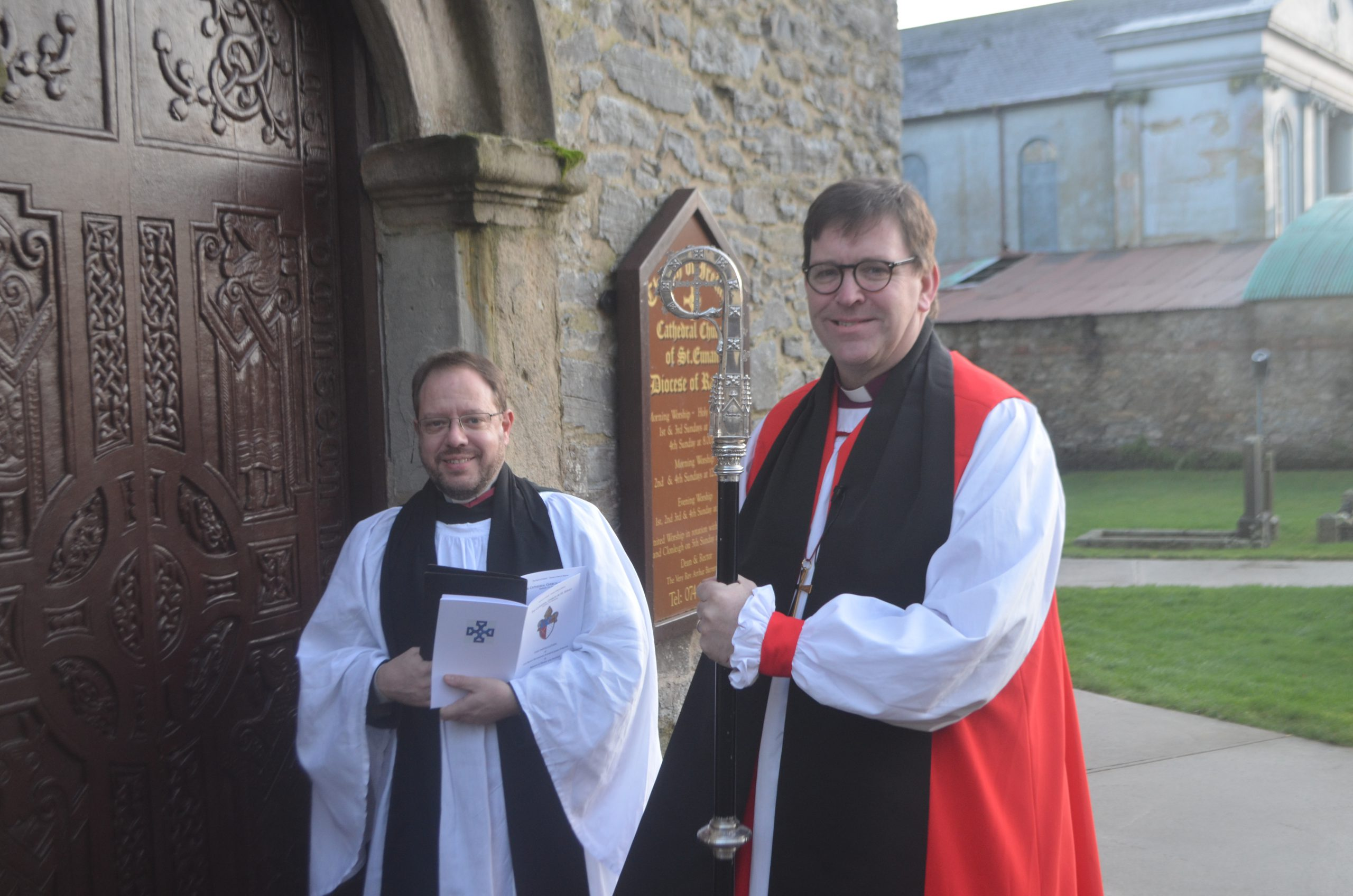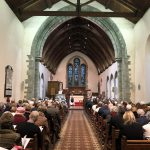A week of vast emotional contrasts for the Diocese of Derry and Raphoe ended on a joyful note late on Sunday afternoon with the installation of Rt Rev Andrew Forster as Bishop of Raphoe at a service in St Eunan’s Cathedral. It took place just over 24 hours after one of the bishop’s predecessors, Rt Rev Dr James Mehaffey, was commended to God at a service in St Columb’s Cathedral in Londonderry.
The relief in Raphoe was almost palpable as parishioners and friends from across the community gathered to celebrate an historic occasion for the diocese. The Republic’s Minister for Education, Joe McHugh, was among those who filled the Cathedral to witness Bishop Forster accepting his mandate and being placed in the Episcopal Seat of the Cathedral Church of Saint Eunan by the Dean of Raphoe, Very Rev Arthur Barrett.
There were representatives present from right across civic life – from an Garda Siochana, education, business, the health sector, community groups, scouting and guiding organisations – as well as from the four main Churches. Also present was the Bishop of Mahajanga in Madagascar, Rt Rev Hall Speers, originally from the Parish of Urney near Strabane, who returns to his diocese in the Indian Ocean on Monday.
In his sermon, Bishop Forster recalled the words of Archbishop Richard Clarke at the Service of Consecration in Armagh Cathedral just over a month ago, when the Primate handed over the pastoral staff – the crozier – of the Diocese: “Keep watch over the flock, of which the Holy Spirit has appointed you shepherd; encourage the faithful; restore the lost; and build up the body of Christ.”
It was, Bishop Forster suggested, a “solemn call to any person, any bishop.” He recalled two men who had held the same office as him previously, one a namesake – Bishop Nicholas Forster – and Dr James Mehaffey.
When the first Bishop Forster died in the middle of the 18th century, he left one thousand guineas to the Diocese – the equivalent of £160,000 nowadays. The current Bishop Forster drew laughter from the congregation when he shared what was written on his predecessor’s gravestone: ‘What he has left let gratitude tell. May his successors imitate him.’ “I would need a substantial pay rise to be able to leave £160,000,” the new Bishop said. “But what an incredible example of a man who sought to care for the flock, to find the lost, and to build up the body of Christ. He was, my namesake, a heart for the poor, a heart for the marginalised and left much behind.”
Bishop James Mehaffey, who died last week, was remembered with great thankfulness and gratitude. “At the heart of Jim’s ministry,” Bishop Forster said, “was a very, very simple truth: people matter. And he saw that as people who perhaps were seen as different from him – people mattered. And what Jim lived out was that as he reached out to those who were seen as ‘other’ and seen as different, that they came to recognise in each other that they were all made in the image of God, with all the dignity and worth and value that that brings. And in the most difficult of days, Bishop Mehaffey was a living example of reconciling love and we can truly say of him, ‘Blessed are the peacemakers for they shall be called the sons of God.’”
There were over 200 years between Bishop Forster and Bishop Mehaffey, the new Bishop said, but yet they lived out that call: ‘Keep watch over the flock over which the Holy Spirit has appointed you shepherd; encourage the faithful; restore the lost; and build up the body of Christ’.
“Now, I want to ask this question: why – why did they do it, Nicholas and Jim? What motivates Christians down through the years – and today – to forsake all to follow Christ; to give of themselves and their resources to care for others; to build up the church; to look beyond ourselves; to seek to respond to both the spiritual and physical needs of the world around us. Why? Why do we do such things?”
Bishop Forster said the answers were in the “powerful” and “beautiful” Old Testament and New Testament readings (Isaiah 42: 1-9 and Matthew 3: 13-17). The first forty chapters of Isaiah were pretty hard going, he said – “It’s all about judgement and decline, and the nations suffering – defeated by their enemies – all seemed bleak, all seemed bleak and dark and black but, as one writer puts it, ‘When the outlook is bleak, try the uplook.’”
Bishop Forster said chapter 42 in Isaiah was a turning point, because it was about God’s promise of hope. “Maybe some of you this evening need to hear God’s promise of hope. If all seems bleak to you, if the outlook seems bleak, try the uplook, because the beautiful words of Isaiah that prophesy of the Messiah Jesus, as God the Father says to you: ‘Here is my servant,’ and we call him Jesus. In a world where so many seem to be at breaking point, for those who feel broken by circumstances beyond their control, or by events in their lives that have taken a terrible toll, this tender-hearted God says to you, and says to the world around us, ‘A bruised reed he will not break.’
“Do you know, a bruised reed in many ways seems valueless, doesn’t it? But we’re told that this God – even something that seems valueless – he will not break. You know there’s so much in our world today that makes people feel they lack value, that they’re not important, that they’re not special. A bruised reed he will not break.
“He’s a tender-hearted God. And if you feel that the lights are going out, that all seems dark, that life has snuffed out some of the light that was there before, this tender-hearted God says to us in Isaiah, ‘A smouldering wick I will not snuff out.’ And that is tender-hearted love to a broken world, to broken lives.”
Bishop Forster turned next to the New Testament reading, a few hundred years after Isaiah, in which we find Jesus – the servant prophesied by the prophet – by the Jordan, such a significant river to the people of God. “It was the river that they crossed that signified the end of their wandering into the place of God’s promise; it was to that river that John the Baptist would go and minister, signifying a turning from one life through repentance to the beginning of another life lived through faith.
“And it’s a river for us that can be a metaphor, can’t it, of putting behind both lostness and wandering, our own exodus away from God, to that point of crossing over to a place of forgiveness and faith and acceptance? And where do we find Jesus? At the river Jordan.
“And there’s a strange little twist in this story because Jesus asks John to baptise him. Now, John’s baptism was for sinners and Christ was sinless but yet Jesus insists that John baptises him. Why does he do that? Why does that happen? Well, gathered around the Jordan that day were the broken, the bruised, the sinner, the hurt and the hurting, the hopeless and those longing for change in their lives. Gathered around the Jordan that day were the bruised reeds, the smouldering wicks, and Jesus is in the middle of it all – right there – identifying with them in their needs, knowing that with them there was this deep search for God, and Jesus stands amongst them. And God says – the Father says – ‘This is my servant. This is my son, the beloved, with whom I am well pleased.’
“What motivated men like Bishop Nicholas Forster and Bishop Jim Mehaffey?” he asked. “What motivates God’s people down through the years to reach out to those in spiritual and physical need? You see, I’m asking the wrong question. It’s not about what motivates them; it’s who motivates them? And the answer is Jesus.
Bishop Andrew said being a follower of Jesus was the most wonderful thing in the world. “It’s because of Jesus, it’s because of Him, that I pledge to you that my heart’s desire to serve you is as someone who will keep watch over a flock ‘which the Holy Spirit has appointed you shepherd’; that I will encourage the faithful; restore the lost; and build up the body of Christ.
“Why? Because of Him. Because of Jesus. Because I know of no one else who can heal broken hearts; no one else who can put the shattered pieces of people’s lives back together; no one else who can bring hope, who can bring courage, who can bring faith and life; no one can do it like Jesus.
“Today,” Bishop Forster said, “I proclaim Him to you because that’s all I can do, that’s all I can do as your bishop, and what we do together is proclaim and share the love of Christ. And we do it together, together as the family of God, together in this Diocese, and we do it together because of Him. His love motivates. His love empowers. His love blesses. His love leads us all. His love changes things. His love brings hope. His love brings peace. And it’s in His name that I seek to serve you.”
After the service, members of the congregation made their way to the parish hall for a rather splendid tea and for speeches by Dean Barrett, Minister McHugh, Rev Colin McKibbin from the Presbyterian Church and Rev Richard Johnston from the Methodist Church. Bishop Alan McGuckian was unable to attend but was represented by the Paarish Priest of Raphoe, Fr Eamonn Kelly.
In the final speech, Bishop Forster encouraged people to pray for political representatives north and south as they sought to build up communities and build up our common life. He urged people not to be too hard on politicians and he led those present in a prayer for members of the Dáil and of the newly-restored Northern Ireland Assembly.
DraggedImage.5f036304717741e9a4a1925ccba4f88d.png
DraggedImage.468ee2ce0c3049f790b100d6c0e6065a.png




